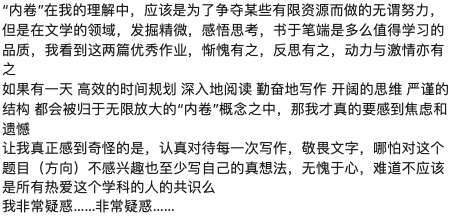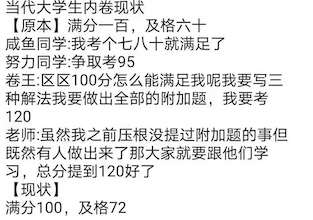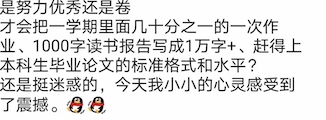When neijuan1, or involution, becomes a buzzword and everyone’s source of anxiety, when we oppose neijuan and turn to tangping2, are we starting to be complacent with our status quo and even starting to deny excellence?
Today, I bumped into a post of an old classmate on WeChat Moments on this topic. I could really feel her enthusiasm for her subject of studying and her honesty with herself. That honesty is a kind of courage—the courage to recognize her own shortcomings and others' excellence, the courage to stay passionate about her subject and to stay motivated despite challenges and difficulties in her studies.
After reading her post, I was so inspired to advance my own studying that I couldn’t help but wanted to note down and share that post, so that I can remember it. So I asked that classmate for permission to post the translated version here:
The Translated Post
In my understanding, neijuan is the meaningless effort one puts in to compete for some finite resources, but in the field of literature, being able to discover and perceive the subtleties, to think deeply, to feel with sensitivity, and to express one’s thoughts in written form are such great qualities that are worth learning from.
If one day, effective time management, in-depth reading, diligent writing, open-minded thinking, and rigorous essay structures will be subsumed under the infinitely expanding concept of neijuan, only then I will really feel anxious and regretful.
What I really find strange is that, shouldn’t it be the consensus of all those who love this discipline to take each written assignment seriously, to respect literature, to at least write out their thoughts truthfully, without any self-guilt, even if they are not interested in the topic (research direction)?
I am very confused… very confused…

A screenshot of the original post
Accompanying Pictures
Here are the pictures that came with the classmate’s post. Each picture is followed by its translation, and the lines in quotes are those from the classmate.
p1 is the trigger for this debate:

Trigger: My teaching assistant showed us two reading notes of about 10,000 characters, praising their rigorous structure and insightful expositions. However, people on my WeChat Moments are mostly worried about themselves, saying the two notes are exacerbating neijuan…
p2 and p3 are two random posts I saw on WeChat Moments:

Post #1
Current situation of neijuan among modern university students:
[Before] Full marks: 100, Passing marks: 60
- Average students: If I get around 70 or 80 marks, I’ll be satisfied.
- Hard-working students: Strive to get 95
- Neijuan king/queen: How can merely 100 marks satisfy me? I want to use three different methods to solve the problem, I want to answer all the additional questions, I want to get 120.
- Teacher: Although I didn’t even mention any additional questions, but since some people have done them, then everyone should look up to them. Doesn’t sound like a bad idea if I raise the total score to 120.
[After] Full marks: 100, Passing marks: 72

Post #2
Is it hard-working or neijuan to write a book review assignment, which is only worth a few tenths in a semester, which only requires 1000 words, in a way that it exceeds 10,000 words and even reaches the standard format and level of an undergraduate thesis? Still quite confused. Today, my young little mind had a shock.
p4 is neijuan:

Involution refers to the phenomenon of peers putting more effort into competing for finite resources, resulting in a decrease in each individual’s effort-to-reward ratio.
My Reflection
When I ask myself for my most honest answer, I know I’m an ordinary person. Although, now, I don’t want to be satisfied with mediocrity, if anything unpredictable happens in the future and leaves me with no other choice, it doesn’t seem like such an unimaginably terrible idea. But if one day, I only scoffed at the outstanding abilities and wonderful characters of others and always labeled them as neijuan or even mocked them, that would just be my pathetic self-deception. I hope that I can confidently pursue my own excellence, and more importantly, I hope that I will retain the ability to appreciate other’s excellence.
-
The Chinese for “involution”, a little-known academic term. In the Chinese context, it describes an environment of endless competitions which require an enormous input that is disproportionate to the limited outcome. See this article for more information. ↩︎
-
It literally translates to “lying flat”. In the Chinese context, the term extends its meaning to a state of avoiding competitions and being complacent to reduce anxiety. A pessimistic response to neijuan which recently became popular on the Chinese internet. ↩︎
